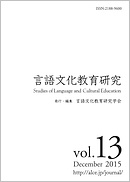Volume 13
Displaying 1-12 of 12 articles from this issue
- |<
- <
- 1
- >
- >|
Special issue on “Reconsidering the classroom, learners, and teachers”
-
2015 Volume 13 Pages 1
Published: December 30, 2015
Released on J-STAGE: March 21, 2016
Download PDF (134K)
Special Contributions: Introduction
-
2015 Volume 13 Pages 2-12
Published: December 30, 2015
Released on J-STAGE: March 21, 2016
Download PDF (794K)
Special Contributions: Position Papers
-
2015 Volume 13 Pages 13-26
Published: December 30, 2015
Released on J-STAGE: March 21, 2016
Download PDF (2049K) -
2015 Volume 13 Pages 27-49
Published: December 30, 2015
Released on J-STAGE: March 21, 2016
Download PDF (1115K)
Special Contributions : Discussion
-
2015 Volume 13 Pages 50-62
Published: December 30, 2015
Released on J-STAGE: March 21, 2016
Download PDF (800K)
Regular contents
Articles
-
2015 Volume 13 Pages 63-82
Published: December 30, 2015
Released on J-STAGE: March 21, 2016
Download PDF (793K) -
2015 Volume 13 Pages 83-96
Published: December 30, 2015
Released on J-STAGE: March 21, 2016
Download PDF (467K) -
2015 Volume 13 Pages 97-117
Published: December 30, 2015
Released on J-STAGE: March 21, 2016
Download PDF (559K) -
2015 Volume 13 Pages 118-133
Published: December 30, 2015
Released on J-STAGE: March 21, 2016
Download PDF (498K) -
2015 Volume 13 Pages 134-148
Published: December 30, 2015
Released on J-STAGE: March 21, 2016
Download PDF (617K)
Editorial Board
-
2015 Volume 13 Pages 149-150
Published: December 30, 2015
Released on J-STAGE: March 21, 2016
Download PDF (524K) -
2015 Volume 13 Pages 151
Published: December 30, 2015
Released on J-STAGE: March 21, 2016
Download PDF (162K)
- |<
- <
- 1
- >
- >|
